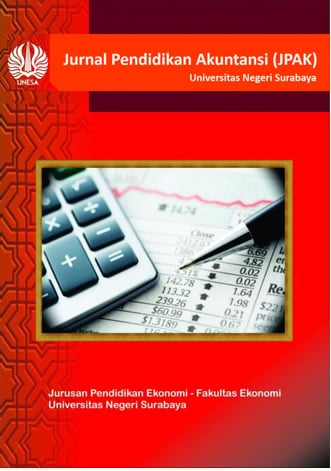Peran Motivasi Belajar Dalam Memediasi Lingkungan Keluarga Dan Kemandirian Belajar Terhadap Hasil Belajar Akuntansi Keuangan Menengah 1
DOI:
https://doi.org/10.26740/jpak.v10n3.p304-314Keywords:
Learning outcomes, family environment, independent learning, motivation to learnAbstract
This research aims to analyze the effect of learning motivation as a mediation variable between family environment and independent learning on intermediate Financial Accounting I learning Outcomes. This study uses quantitative approach. The sampling techniques using purposive sampling so that 112 students were obtained as respondents. Data collection techniques through questionnaires and documentation. Data were analyzed using classical assumption test, regression analysis, path analysis and sobel test . The findings in this study show that (1) family environment have significant direct impact on intermediate Financial Accounting learning Outcomes. (2) Independent learning have significant direct impact on intermediate Financial Accounting learning Outcomes. (3) learning motivation have significant direct impact on intermediate Financial Accounting learning Outcomes. (4) family environment have significant direct impact on learning motivation. (5) Independent learning have significant direct impact on learning motivation. (6) Learning motivation cannot mediate family environment on intermediate Financial Accounting learning Outcomes. (7) Learning motivation mediate independent learning on intermediate Financial Accounting learning Outcomes.
Downloads
Downloads
Published
How to Cite
Issue
Section
License
Authors who publish with this journal agree to the following terms:
- Authors retain copyright and grant the journal right of first publication with the work simultaneously licensed under a Creative Commons Attribution License that allows others to share the work with an acknowledgement of the work's authorship and initial publication in this journal.
- Authors are able to enter into separate, additional contractual arrangements for the non-exclusive distribution of the journal's published version of the work (e.g., post it to an institutional repository or publish it in a book), with an acknowledgement of its initial publication in this journal.
- Authors are permitted and encouraged to post their work online (e.g., in institutional repositories or on their website) prior to and during the submission process, as it can lead to productive exchanges, as well as earlier and greater citation of published work (See The Effect of Open Access).

Jurnal Pendidikan Akuntansi (JPAK) is licensed under a Creative Commons Attribution-NonCommercial 4.0 International License.
 Abstract views: 588
,
Abstract views: 588
, PDF Downloads: 492
PDF Downloads: 492



